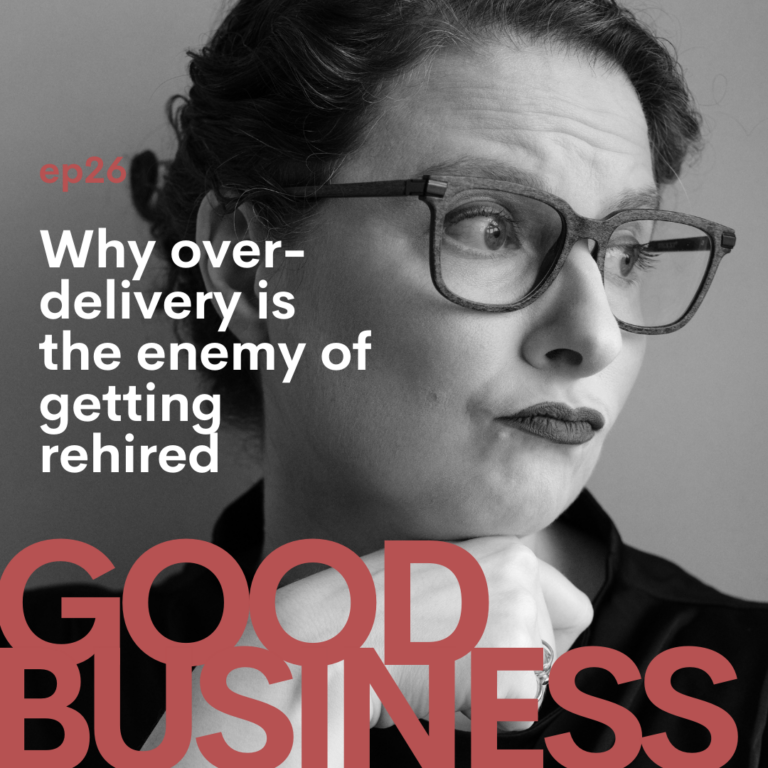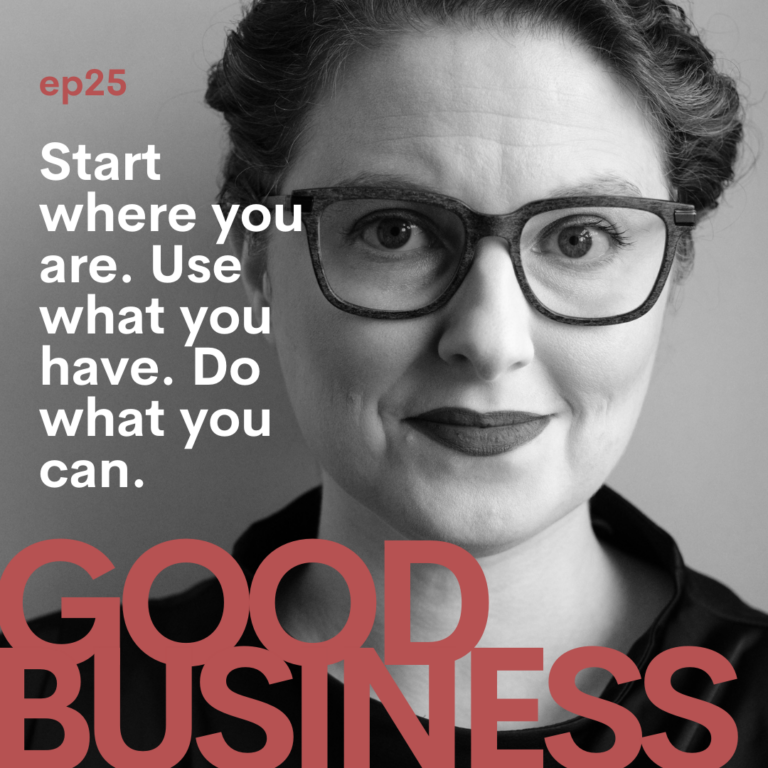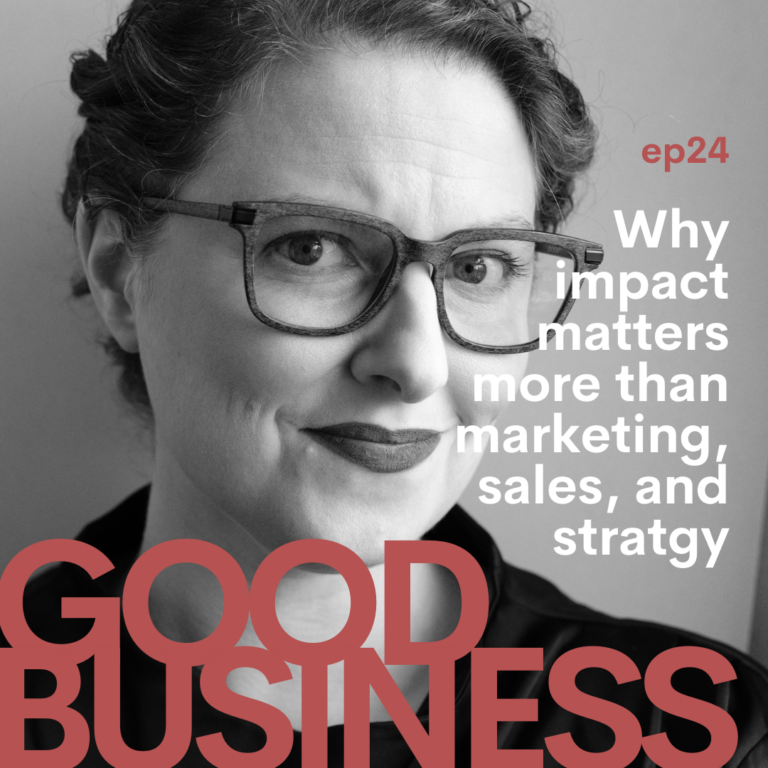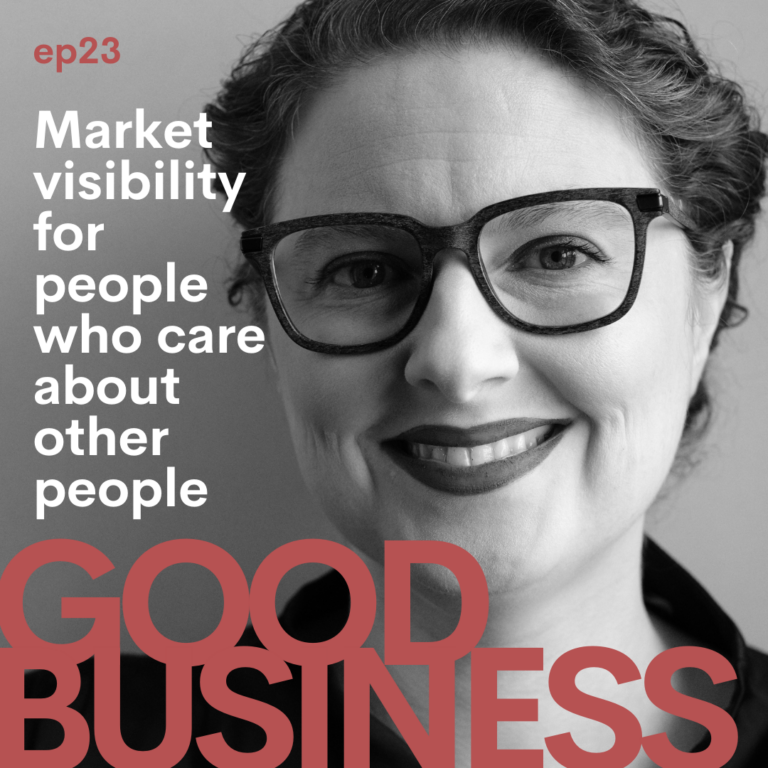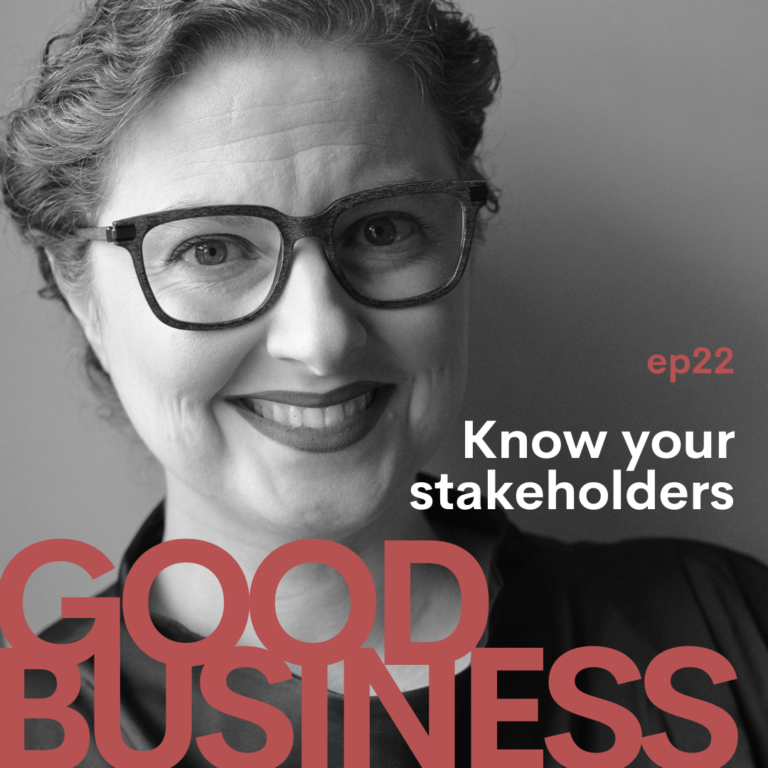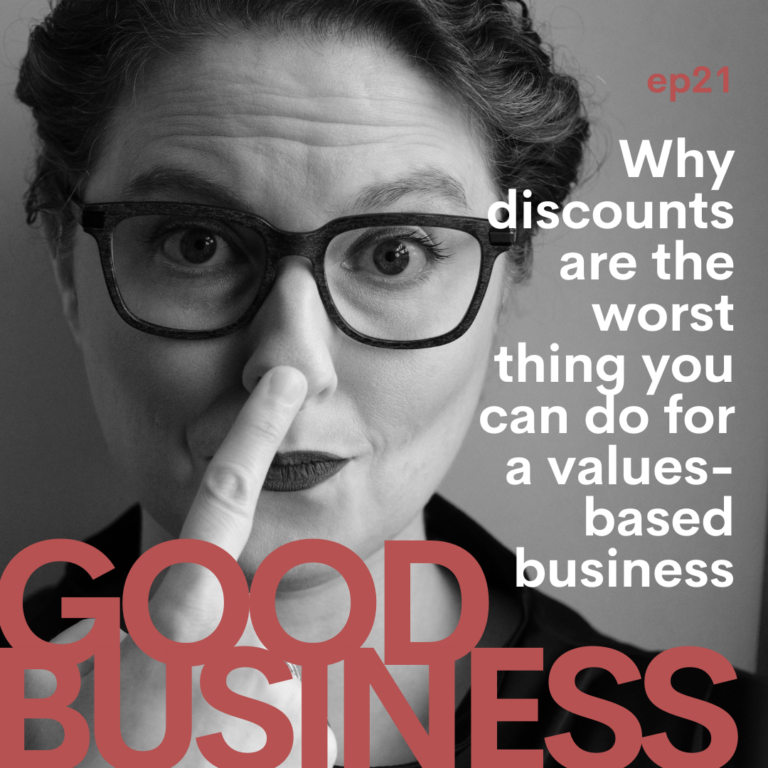This episode breaks down the popular trope that if you don’t charge a lot, people won’t value your work. First, we talk about the conditions that make this a common piece of advice. Then I lay out why this is complete crap for certain kinds of businesses. Finally, the episode wraps up with a brief primer on how to think about pricing in a way that serves your people AND your bigger dreams for yourself.
Episode Transcript:
I’m Illana Burk, CEO of Your Life’s Workshop, coach to entrepreneurs and solopreneurs across dozens of industries and host of Good Business. With nearly 20 years experience helping hundreds of clients create profitable, ethically driven and sustainable businesses based on their life’s work, I’m here to teach you how to do great work, make great money, and make a positive impact without feeling like you need a shower afterwards.
Hi everybody. On today’s episode, we’re going to break down the popular trope that you have to charge a lot or your people won’t value your work. First, we’ll talk about the conditions that make this a common piece of advice. Then, I’ll lay out why this is complete crap for all kinds of businesses. Not all of them, but most of them, most of you that are listening, it’s probably not great advice for you. Finally, we’ll wrap up with a brief primer on how to think about pricing in a way that’s actually of service to both your people and your bigger dreams for yourself.
First off, we’ve all heard this stuff. Charge what you’re worth. If people don’t put a high price tag on your services, no one will value the information. People only commit when they have significant skin in the game. We’ve all heard this stuff. It’s not new. It’s prevalent though because it’s advice that often works. You charge a lot. You get highly engaged people who do their homework and pay attention. That’s the way it is. Why is that? It’s because a significant portion of the population confuses monetary exchange with value and it’s not their fault. Literally, everywhere we look, our culture reinforces that money equals investment equals return. It’s everywhere. At every level of society. It’s the backbone of capitalism and for those who that motivates, great. If you want programs packed with people motivated by a financial exchange, fantastic, do that. Fine. I’m not saying that this is wrong. I’m not saying that you shouldn’t charge a lot of money for your services either. That’s not the point of this.
The simple idea that I’m challenging is that you don’t have to charge a lot for people to value what you do. You have to have high value. That’s the difference. If you want more than that, if you want people that are motivated by the impact you have on their lives, by the effect that working with you creates in their world. If you want your programs and your client roster full of the people who need you most and not just those who can afford you, then that’s why you’re here today. So keep listening.
That gets me to the meat of today’s conversation. If the impact is truly at the center of why you do what you do, then equating value in prices is the fastest way to only help people with money. Think about that. If you are pricing services like let’s say coaching services. If you’re pricing your services at $5,000, say for three months of business coaching. Now I know all kinds of arguments can be made for if that advice pays off and that person makes six figures off of that investment, then, of course, it’s worthwhile. Nobody said it’s not worthwhile.
What I’m saying is that if you’re telling people they have to go into debt to work with you, they might not get to where they need to go. If they make that six figures off of it, great. But if you’re going to meet your clients where they are now, where you’re looking eye to eye with them with respect and helpfulness first, then you have to help them from where they are. If they can’t afford that, then you’re only helping the people who can, which oftentimes in a lot of industries is the last people that need help the most. It might be really good for your immediate bottom line. Of course. It doesn’t mean that it’s good for your long-term one. It doesn’t mean that that’s sustainable, nor does it mean that you’ll ever actually get to do the work that you most love and help the people that most need you.
I want to give you a little example. I’m going to tell you a little story. I have a coaching client. She was someone who’s been hanging out in my orbit for a long time before she finally hired me. While she’s making a great living, she needed some major changes in who she works with and how she makes a living. She was getting super burned out and not loving her clientele. She was growing out of what she was doing, the kind of service provider model she was in. As we began to transition her out of her former revenue model and into one that was a better fit for her, that meant that she had to cut back on how much she was making presently to make room for building new things in the future. That meant that she had less money for things that were not essential. This is somebody who is our stock and trade basic solopreneur like a lot of us, just making a living. We’re not necessarily making the crazy six-figure launches. The vast majority of the people listening to this are getting by. Some of us are making six figures. Some of us are making well into six figures. It doesn’t necessarily mean that you’re rolling in dough and that when you make a change and pull back on your income, you can just afford things beyond groceries and bills. That’s reality. This is hard. It’s a struggle. It doesn’t always get easier. For most people, it won’t get easier. Knowing that, knowing that I’m in a position to help people with something that is frankly a luxury, getting help from someone to explain things to you and to offer you new perspectives and expertise is a luxury. I know that I’m a luxury product as a coach as a business coach. I am nonessential. Now, I love that some of my clients are listening to this going, but you are, but you are. You’re devaluing yourself. I’m not honestly.
I know that what I do is of high value, but is it of higher value than feeding your kids? No, of course not. Sometimes it can come down to that choice. It can come down to whether or not you have enough cash in the bank to send your kid to camp or pay me. That’s reality. I know that. You have to know your position; you have to know where you stand. That meant at that stage, back to the story. That meant at that stage, she had less cash for things like business coaching because her income pulls back. That means that her essentials take more space. Rather than cut the line when she needed me the most, just because she could no longer pay my full rate, we provided her with a partial scholarship to get her through the lean time. She’s happy. I get to keep a client I adore, and together, we both get to do what we most want to do.
Kind of neat. Kind of a win-win. Isn’t that the whole fucking idea of being in business for yourself is having win-wins. So here’s the kicker. The minute she could afford it, I mean we’re talking, I told her that I would give her three months and then we’d reevaluate. The minute she could afford it. The minute she had a client who was willing to pay her a little extra and if she built up a little bit of kind of new types of revenue, the minute she could, she called me and asked me to pay her original hire rate. I didn’t have to ask, I didn’t say a word about it, and she’s back to her higher rate, and I have a client for life that thinks that I walk on water. If you’re listening, thanks for the story!
Instead of treating her like she had to invest in me like it was a one-way street like if she were smart, she’d invest in paying me a fortune, we invested in each other. I went out on a little limb, she went out on a little limb, we met in the middle, and we got to be on equal ground. My value to her as well established because she invested in a level she could reasonably afford, and my advice is helping her grow. She didn’t need to spend at a level that meant she couldn’t afford her basic needs to feel like she was getting good advice.
So how do you price your stuff? First, get clear on why you do what you do. Now I’m not talking big why. Yes, that’s kind of part of all pieces of business advice these days. More like, do I want to help first or make money first? Yes, I know you want to do both, but one has to be an inch or two above the other in what motivates you, and everybody’s different on that spectrum. Again, no judgment. If money is your primary motivator, there are plenty of people in business that it’s simply about money. But you’re not here for that. If you’re listening, you’re in the purpose-driven category. So from here forward, we’re going to assume that you care about impact, service, and helpfulness, just like a teensy bit more than cash.
So next, you’re going to figure out a revenue path that can get you both where you want to go and can satisfy your desire for impact. That means you have to figure out offers that fuel exactly how you want to work and can meet the people you most want to serve, where they are. Now, if you most want to serve people, like let’s say you’re a financial planner for the wealthy, guess what, congratulations you picked a revenue model that you get to charge a buttload of money for. If you want to focus on helping people recover from bankruptcy, you’re probably not going to get to charge $5,000 for a coaching package. You might get to charge 50 bucks for a coaching package, but you’re going to need to come up with a revenue model that means you can make a living. If you’re working with people that don’t have a lot of money and you most want to help people that don’t have a lot of money, get used to the idea that you’re going to need to work on volume. You’re going to have to have a really big list. You’re going to have to focus on growing your reach, creating the leadership brand, and having an impact with a large group of people for a small amount of money.
That’s just one example of a revenue model that I’m talking about that can satisfy your desire for impact over financial return from a small number of people. So you figure out your who you want to work with and have the kind of impact you want to have and then work backward from there.
Now, we’ll talk a lot about pricing on future episodes. This is just one little chunk of it. I could do like a whole show just on pricing. That could be the focus of my entire podcast. Today I want to give you guys bite-sized pieces, things that you can think about and chew on and pay attention to in your businesses and your livelihoods and in the people that you’re giving money to. Notice whether they’re making you feel like you have to invest or you’re somehow not valuing yourself, your work or them highly enough. If they make you feel that way, run like you’re fucking hair’s on fire. Okay?
Okay. That’s it for me to for today, you guys. Thanks for joining me and as always, we’ll see you in a couple of weeks. Alright, have a great one guys. Bye Bye.
Thanks so much for hanging out with me today. For more information, visit www.thegoodbusiness.co or www.lifesworksdev.wpengine.com.
More Episodes
Why overdelivery is the enemy of getting rehired | GB26
Today’s episode is all about why over-delivering is a really good way to not get asked back for more work. We all think doing our best and giving more than people asked for is a good thing. And in some ways, it is. Things like adding extra value to something you do is fine. What I’m talking about is when you completely blow the scope of what was asked of you out of the water. It’s one of the hardest things to identify when you’re trying to figure out why no one seems to hire you twice.
Start where you are. Use what you have. Do what you can. | GB 25
Today’s episode of The Good Business Podcast is all about my very favorite quote in the whole world. “Start where you are. Use what you have. Do what you can.” by Arthur Ashe
Why impact matters as much as marketing, sales, or strategy. Maybe more. | GB24
Today’s episode is less of a lesson than recent episodes. Instead, today we’re making a case for a topic we’ll be talking a LOT more about in the future: IMPACT. What it is. Why it matters. And how to pay attention to it.
Market visibility for people who care about other people | GB23
Today is a branch off of our stakeholder conversation. If you listened to that episode, you should have a clear picture of exactly who matters to you and your work and why, as well as how much time you have for your work without sacrificing what those VIPs need and expect from you. Next up, we talk about exposure, protection, and the responsibility you have to those who matter most.
Know Your Stakeholders | GB22
In this episode, I’m going to walk you through how to think about establishing your stakeholders, the steps you need to take to do so, and how to make decisions based on who they are without compromising those big fat dreams we’ve been talking about.
Pricing Basics: Why discounts are almost never a good idea | GB21
Today’s episode dovetails on our last one, where we talked all about how your value isn’t determined by your price tag. Today, we’re talking about discounts. First, we’ll talk about why businesses offer them, what their purpose is and when they ARE a good idea. Then we’ll talk about why they are probably a bad idea for you and what to do instead.

